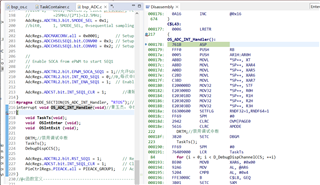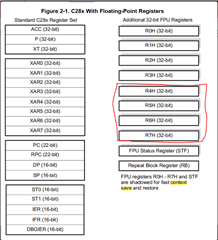Hi Team,
There's an issue from the customer need your help:
Recently ported OS to DSP28335, need to consider CPU floating point register context save, disassembly discovery, interrupt service context only RBS, R0H, R1H, R2H, R3H, and STF. Other floating-point related registers are not saved, does this not affect floating-point calculations?
CCS version :12.1.0.00007, latest compiler, other older compilers have tried it as well, both of which are the same. Disassembles code for an interrupt service function as shown in the following figure:

I look at the technical document for floating point registers as shown in the figure, the red circle part is not saved:

Could you help check this case please? Thanks,
Best Regards,
Ben

